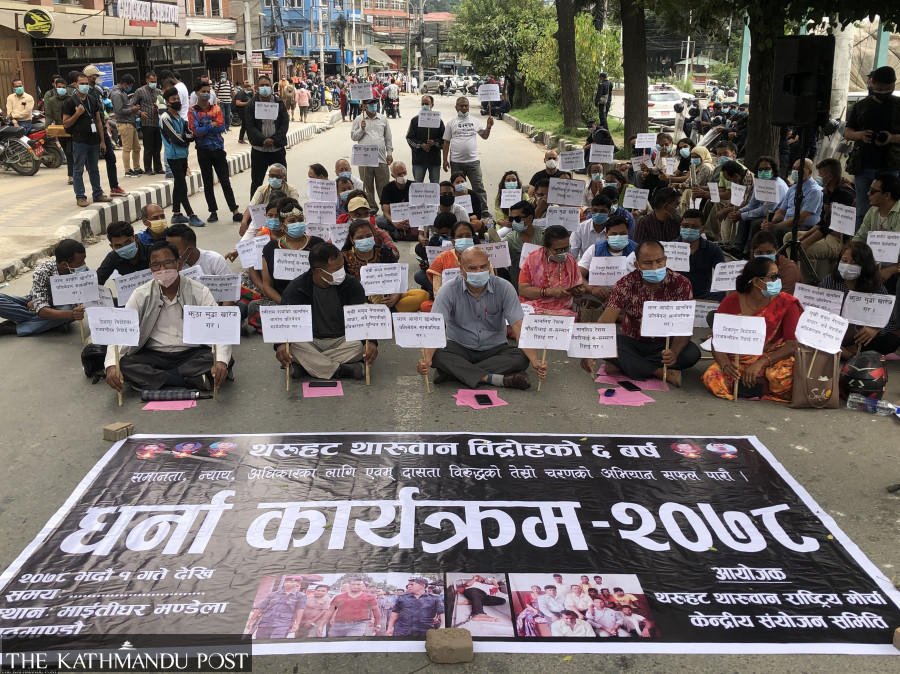National
Tharu Morcha in protest, pressuring government to implement past agreements
Brihat Nagarik Aandolan, an alliance of civil society members and people from various walks of life, supports the protest.
Binod Ghimire
On different occasions, successive governments prior to the promulgation of the Constitution of Nepal in 2015 forged agreements with protesters from the Tharu community to have a separate Tharuwan province in western Nepal.
Together with other indigenous communities, the Tharus too held protests demanding delineation of the provinces based on identity. When their demonstrations were ongoing, eight people including a senior superintendent of Nepal Police and a toddler were killed in Tikapur, Kailali district in August, 2015.
Dozens of protesters were arrested in connection with the killings. Nineteen of them, including Resham Chaudhary, a member of the House of Representatives, are languishing in prisons in different parts of the country.
The incident marks six years next week. Leaders from the Tharuhat Tharuwan Rashtriya Morcha started a fresh protest in the Capital on Tuesday, demanding the government release those in prisons and follow through on the past agreements.
“We were told that our concerns will be addressed through an amendment to the constitution,” Bhanu Ram Tharu, an adviser to Morcha, told the Post. “However, it hasn’t been implemented even six years after the promulgation of the constitution.”
Tharu said that their protest is aimed at pressuring the government to withdraw the cases against those who have been treated as criminals for participating in a political movement.
The protesters say the Tikapur incident was a part of the political movement turned deadly due to an instigation by the state authority. The Tharu protesters say SSP Laxman Neupane was killed because the state authority itself hatched a conspiracy in its search for a way to weaken their movement.
“Neupane and his aides were unarmed despite knowing that the protest was going to be huge so as to breach the government’s restrictions,” said Tharu.
Minutes before he was killed in cold blood, unarmed SSP Neupane had attempted to talk to the enraged protesters who were in their thousands. Two of his security guards were also without arms when the incident took place.
Thousands of demonstrators who had arrived from several villages wanted to take out a rally in the prohibited zone. There was a scuffle when the police tried to stop them. The security personnel lobbed tear gas canisters to disperse the crowd. But the protesters, using another path, suddenly encircled the police and attacked them indiscriminately.
“The government prepared a fake case against many including Resham Chaudhary,” Shrawan Tharu, acting coordinator of the Morcha, told the Post.
He said only the protests by the Tharu and Madhesi communities have been treated as criminal acts.
“This is state’s discrimination against the marginalised community,” he said.
Brihat Nagarik Aandolan, an alliance formed by civil society members and people from various walks of life, too, has supported the protest that will continue until Thursday. The protesters say this is just the beginning of their protest, which will continue until their demands are met.
Mohna Ansari, a former member of the National Human Rights Commission, said they have supported the protest because genuine concerns have been ignored by successive governments.
“Dozens of people from the Tharu community were tortured after the killings but they never got justice. The government must make public the report by the Lal Commission and implement its recommendations,” she told the Post.
Despite the Supreme Court’s order and the ruling from Parliament, the government is yet to make the report public.
The government in February 2016 formed the commission led by Girish Chandra Lal, a former justice at the Supreme Court to look into the atrocities committed during the Madhes and Tharu protests in 2015, which were organised against the drafting and promulgation of the constitution.
Protests had erupted in the run-up to the constitution promulgation, as identity-based parties opposed the plans of four major forces to push through the finalisation of the statute in the Constituent Assembly. The commission investigated a total of 3,264 complaints registered to it.
According to the report, 66 people—including 10 police personnel, 18-month, four-year and 15-year-old children were killed during the movement. Of them, 62, including police officers, were declared martyrs, while four had not been conferred the status.
The commission visited 18 districts for the probe. The report has recommended that the government strengthen the mechanism to control riots and agitations.
The seven-member commission was mandated to probe the incidents that took place during the Madhes movement, to find facts about the incidents, to recommend compensation for the victims and take action against those held responsible for the killings.
“The reality behind the Tikapur incident will be out once the report is made public. The state’s actions must be in line with its recommendations,” said Ansari.




 9.89°C Kathmandu
9.89°C Kathmandu














